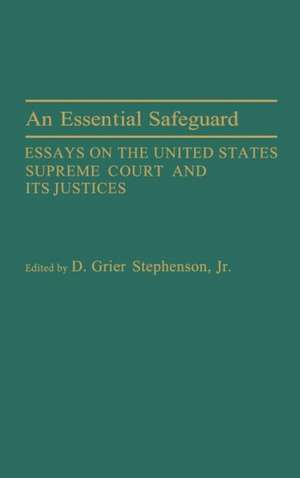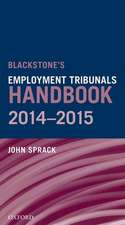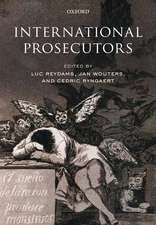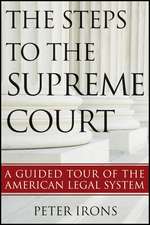An Essential Safeguard: Essays on the United States Supreme Court and Its Justices: Contributions in Legal Studies
Autor Donald Grier Stephenson Jr.en Limba Engleză Hardback – 29 mar 1991 – vârsta până la 17 ani
Din seria Contributions in Legal Studies
- 23%
 Preț: 499.54 lei
Preț: 499.54 lei - 22%
 Preț: 698.29 lei
Preț: 698.29 lei - 28%
 Preț: 438.07 lei
Preț: 438.07 lei - 28%
 Preț: 344.63 lei
Preț: 344.63 lei - 27%
 Preț: 438.33 lei
Preț: 438.33 lei - 27%
 Preț: 345.83 lei
Preț: 345.83 lei - 28%
 Preț: 436.57 lei
Preț: 436.57 lei - 28%
 Preț: 462.79 lei
Preț: 462.79 lei - 28%
 Preț: 436.80 lei
Preț: 436.80 lei - 28%
 Preț: 344.58 lei
Preț: 344.58 lei - 27%
 Preț: 345.15 lei
Preț: 345.15 lei - 28%
 Preț: 438.17 lei
Preț: 438.17 lei - 27%
 Preț: 438.33 lei
Preț: 438.33 lei - 27%
 Preț: 441.13 lei
Preț: 441.13 lei - 27%
 Preț: 363.81 lei
Preț: 363.81 lei - 27%
 Preț: 439.85 lei
Preț: 439.85 lei - 24%
 Preț: 460.93 lei
Preț: 460.93 lei - 28%
 Preț: 436.80 lei
Preț: 436.80 lei - 28%
 Preț: 437.24 lei
Preț: 437.24 lei - 28%
 Preț: 437.40 lei
Preț: 437.40 lei - 27%
 Preț: 345.07 lei
Preț: 345.07 lei - 28%
 Preț: 436.80 lei
Preț: 436.80 lei - 24%
 Preț: 363.73 lei
Preț: 363.73 lei - 38%
 Preț: 344.22 lei
Preț: 344.22 lei - 38%
 Preț: 439.09 lei
Preț: 439.09 lei - 38%
 Preț: 438.00 lei
Preț: 438.00 lei - 38%
 Preț: 437.07 lei
Preț: 437.07 lei - 27%
 Preț: 438.33 lei
Preț: 438.33 lei - 27%
 Preț: 438.07 lei
Preț: 438.07 lei - 28%
 Preț: 436.80 lei
Preț: 436.80 lei - 28%
 Preț: 437.75 lei
Preț: 437.75 lei - 38%
 Preț: 345.58 lei
Preț: 345.58 lei - 27%
 Preț: 346.67 lei
Preț: 346.67 lei - 28%
 Preț: 436.04 lei
Preț: 436.04 lei - 27%
 Preț: 443.31 lei
Preț: 443.31 lei - 28%
 Preț: 436.99 lei
Preț: 436.99 lei - 27%
 Preț: 684.18 lei
Preț: 684.18 lei - 38%
 Preț: 345.74 lei
Preț: 345.74 lei - 38%
 Preț: 344.05 lei
Preț: 344.05 lei - 38%
 Preț: 438.17 lei
Preț: 438.17 lei - 27%
 Preț: 345.67 lei
Preț: 345.67 lei - 27%
 Preț: 438.76 lei
Preț: 438.76 lei - 27%
 Preț: 442.97 lei
Preț: 442.97 lei - 38%
 Preț: 437.15 lei
Preț: 437.15 lei - 23%
 Preț: 448.70 lei
Preț: 448.70 lei
Preț: 436.47 lei
Preț vechi: 707.02 lei
-38% Nou
Puncte Express: 655
Preț estimativ în valută:
83.53€ • 86.88$ • 68.96£
83.53€ • 86.88$ • 68.96£
Carte tipărită la comandă
Livrare economică 12-26 aprilie
Preluare comenzi: 021 569.72.76
Specificații
ISBN-13: 9780313274381
ISBN-10: 031327438X
Pagini: 192
Dimensiuni: 156 x 235 x 13 mm
Greutate: 0.45 kg
Ediția:New.
Editura: Bloomsbury Publishing
Colecția Praeger
Seria Contributions in Legal Studies
Locul publicării:New York, United States
ISBN-10: 031327438X
Pagini: 192
Dimensiuni: 156 x 235 x 13 mm
Greutate: 0.45 kg
Ediția:New.
Editura: Bloomsbury Publishing
Colecția Praeger
Seria Contributions in Legal Studies
Locul publicării:New York, United States
Notă biografică
D. GRIER STEPHENSON Jr. is Charles A. Dana Professor of Government at Franklin and Marshall College. His previous books include The Supreme Court and the American Republic, American Constitutional Law (with Alpheus T. Mason), and American Government, which he is currently revising with his co-authors for a second edition. His articles Religion and the Constitution: An Uncertain Consensus, Vicarious Federalism, The Supreme Court, the Franchise, and the Fifteenth Amendment, and The Judicial Bookshelf have been published in various journals since 1987.
Cuprins
PrefaceIntroduction: The Supreme Court in American Government by D. Grier Stephenson, Jr.Can Presidents Really Pack the Supreme Court? by Henry J. AbrahamThe Office of Solicitor General: Political Appointee, Advocate, and Officer of the Court by Rex E. LeeConflict and Leadership on the U.S. Supreme Court: From Marshall to Rehnquist by James F. SimonJustice Sandra Day O'Connor: An Assessment by Harold J. SpaethThe Constitution and the Legacy of Justice William O. Douglas by Walter F. MurphyJohn Marshall Harlan: A Modern Conservative Justice by William M. BeaneyAffirmative Action and the Supreme Court by Jesse H. ChoperChief Justice Rehnquist and the Future of the Supreme Court by Martin ShapiroSelected BibliographyIndex












